#retroactive reality change
Explore tagged Tumblr posts
Text
Company onboarding:
Attribute theft, size changing, breast expansion, bimboification, retroactive reality changes, minor personality changes,

Cusi was on her pad doing her onboarding process for Knight's Industriws while her girlfriend Khadija worked on the list of groceries. She was so excited to work for the Goddess of Love. Years of studying business, working endlessly in offices and now she was finally able to work from home making so much more. As long as she deciphered these confounded onboarding questions.
The first question had a list of different letters and some of the letters were doubles and even triple letters.
A, B, C, D, DD, E, G, GG, GGG, were all options that were available. No question nor context given. So at random she chose A and she got a pop up.
At Knights Industries we value initiative and going above and beyond. Are you certain you want the bare minimum or do you want to do the bare maximum? It asked
"Oh. I get it now." Cusi giggled not sure where the giggle came from. So she selected G from the list.

Cusi adjusted her sweater. It felt too tight over her big boobs. Her light pink bra comfortably holding the large breasts as Khadija snuck a peak at Cusi.
"You doing okay?" She asked glancing at her girlfriend's breasts as Cusi giggled and squeezed them together.
"I'm fine I just figured out the first step now I can keep going." She said enjoying the fact that Khadija was starring at her maybe she would take a break with Khadija soon.
The next question had more numbers and apostrophes. Cusi wasn't very good at numbers. She did graduate at the top of business class but those were business numbers. These were different types of numbers.
0' 6", 1' 6", 2' 6", 3' 6", 4' 6", 5' 6" 6' 6", and 7' 6".
Well clearly they wanted her to go big so she went big. She clicked 7' 6".

Cusi's sweater was gone now. She wasn't sure where she got the idea that she had a sweater. She was too big to wear sweaters and most clothing. It cost her a near fortune just to afford underwear and torn pants from Goodwill that couldn't quite reach her hips. She took a break and went to the kitchen and when she came back she saw Khadija starring.
"Like what you see Dija?" She said jiggling and squeezing her breasts right in front of her Muslim girlfriend. She enjoyed making her flustered but Khadija knew what she was getting into when she asked Cusi out when Cusi could barely wear clothes which went hand in hand with her attention and exhibition kinks.
But she was happy to keep it private for Khadija.
"Just a few more questions cutie and these are all yours." She said as she pressed her breasts to Khadija's face.
"Good girl you're such a good girl. Thank you for supporting a dummy like me. I'll reward you later." Cusi cooed as she sat at the table now built for her height while Khadija looked so small in her seat.
"Are you a veteran or have you served in the military?" The question asked. While Cusi served about a year due to the draft she wouldn't count it as a veteran so she pressed no. And then her experience in the military disappeared.
She no longer had military discipline, she no longer had those memories. And she didn't know what she was missing.
"Do you have any disabilities?" The next question asked. Cusi had a severe food allergy but she knew if she said yes it would hurt her chances so she selected no.
Now Cusi found herself snacking on a candy bar. She didn't know why she thought she had a food allergy she always loved trying new food with Khadija.
"Do you have autism?" She selected no. There was a sudden pop up.
"This cannot be changed." So she was given another chance but the no option was grayed out so she chose yes.
Gender: was a selection and she chose female.
Finally came to the tax form. Which had a binary choice.
"Do you want to get paid taxes or pay taxes?" It asked and Cusi didn't have an answer.
"Um Dee? Can you help me this question is really hard?" She asked her girlfriend who came over and she tried explaining it to Cusi but she didn't get it so Khadija offered to tell her what options to choose.

"Thanks Di you're the best." Cusi said as she tried to read over what was on the screen but the words felt wrong and hard to read but Khadija told her what to fill in.
Finally there was a choice of "compensation" and Khadija eagerly chose immediately.
"There you go. You're all done."
"I have a big job there?" Cusi asked excited while Khadija shook her head.
"No you silly girl. You're too dumb to work an executive job. You didn't graduate high school let alone college. I am the business major with a year of being a military captain. So that was my job you just helped me with." Khadija said while Cusi was confused.
"But I thought I was ap... appl... getting job?" She asked Khadija who shook her head extremely confident.
"Sweet Cusi. You're beautiful but you're so dumb. It's why I fell in love with you. You don't have any formal job experience. After graduation we stayed girlfriends and you've been my assistant the entire time. Not a very good assistant because you can barely read. But my favorite assistant because you give me a lot of head and your titties are fun to touch."
She said reaching out to grab Cusi's breasts that were the same height as her face.

Cusi relaxed hearing Khadija's words.
"So let's head to the bedroom and celebrate." Khadija said as she lead her much taller girlfriend into the bedroom.
Two new applicants for Knight's Industries have been accepted. A C level position and her assistant. When filling out onboarding be aware of what happens when you say you're a confident leader who takes what she wants.
And don't let anyone else do your onboarding.
Bimboification may occur.
96 notes
·
View notes
Text

This lore is WILD and VERY fascinating.
The SCP foundation is real and every "rule" of reality was actually artificially set in place by a magic book. The SCP foundation has to regularly complete objectives set by the book or suffer a penalty of an additional rule being added to reality which affects the world retroactively. Rules previously added include the existence of sex, death, race, language, luck, outer space, truth, rot, avoidance, change, justice, etc.
Sometimes, people are born with the ability to negate a specific rule. These abilities are how we get the show's intricate stand battles. The two main characters can negate death and luck respectively, hence the title of the series.
Lore this dense is not at ALL what I expected from the initial premise of "guy who can't die romances girl who makes everyone die". It fucking rules.
AND I'M ONLY ON EPISODE TEN
573 notes
·
View notes
Text
On Tommy and narrative threads
So some fans who are vehemently anti-Tommy frequently use the talking point that they need to have Buck confront Tommy about his past behavior while under Gerrard, or have him find out about it if he doesn't already know, and that he should break up with him about it. Or they need some kind of reckoning to happen with Hen and Chim in order to move forward.
I'm 95% sure neither of those things are going to happen, and here is why: the show considers that narrative thread to be closed.
It has run its course. It's done. It's been resolved. As fans and viewers - and as many of us are fic readers and writers - we always want to see things hashed out onscreen in exhaustive detail but that's not practically possible. The narrative sometimes has to signal that threads are resolved in other ways, in the way characters act towards each other and speak about each other.
Throughout the course of the three Begins episodes in which he appears, the writers clearly selected Tommy to represent the "firefighter who acted kinda jerky but got better through personal growth and friendship with new people" narrative. By the end of Bobby Begins Again, this narrative is more or less complete, as we've now seen Tommy act to support Hen and also be accepted into a friendly relationship with both her and Chim, not to mention Bobby. When he reappears in season 7, nobody acts like he's anything other than a friend, and Chim outright admires him.
This is the conclusion of this thread, as far as the show is concerned. Did he ever sit down with Hen and Chim and make some big speech or have some big discussion about how he's learned and changed? Probably not. Those kinds of direct conversations sometimes do happen in reality, but more often than not, you just spend years working with someone and your opinion of them shifts as all of you change. And remember, Hen and Chim worked with Tommy for years before Bobby even showed up.
And ask yourself this question: if Hen and Chim have both moved on, and have accepted whatever direct or implicit apology Tommy offered, how is it Buck's business to decide that no, that's not good enough, HE'S going to demand some kind of restitution on their behalf? That's patronizing as fuck. These are people with their own agency who don't need Buck to advocate for them and exact some kind of retroactive revenge for something they're not even mad about anymore. Would he be upset that Tommy ever made off-color remarks, or was less than welcoming to people who are now his friends? Maybe. Is he upset that Eddie nearly killed a man? Is he filled with moral outrage and disappointment that Hen cheated on her wife? Chim physically assaulted him, and so did Bobby. Is he still holding that against them? Is he upset NOW that nobody's speaking up on HIS behalf when Gerrard targets him? Buck's an adult. He knows that people frequently look back on their past behavior and cringe at what jerks they were, himself included.
Tommy has several times alluded to being ashamed of his past actions. He knows the score. The message we're meant to take from those comments is that he's taken steps to not be that guy anymore. Need he flagellate himself forever? Does this need to cost him and Buck a relationship they both value? It can't have been easy to come from a terrible father, go into the army, then into the LAFD with a terrible captain, and then to meet people who challenged your behavior and made you want to be a better person. The fact that he became a better person is something he should be admired for, not punished.
581 notes
·
View notes
Text
Time Squad posits such a troubling reality in which past events can retroactively change. The first episode explains that history deteriorates the older it gets and has to be repeatedly corrected. It's not fixed forever with one time travel adventure. The thing they had to correct wasn't just the real original story like in Mr. Peabody. No. Things happening right now could be because we're in a past that has begun to rot and only Larry 3000 can help
214 notes
·
View notes
Text
Amazing Digital Circus Theory: Gangle is an NPC
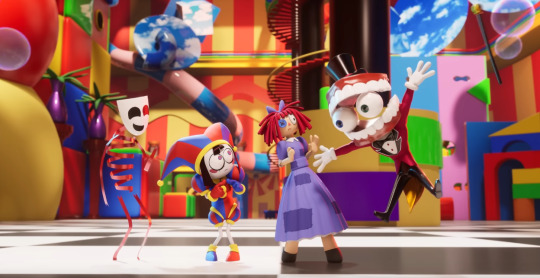
Sooo, I wasn’t expecting to talk about this show. I was perfectly content to just enjoy Digital Circus as is.
It’s a show that invites theories as to what exactly’s going on with the setting and characters, but I didn’t have much room to think too hard about it. Who’s Abel? Is Pomni really a human? Why is this VR game emulating an N64 game at the start? I like the show plenty, but it just wasn’t as interesting to go hard on any of those questions at the time.
But with this recent episode… a single, perhaps throwaway line got the brain nagging. And it’s kind of a bizarre one to waste hours analyzing.
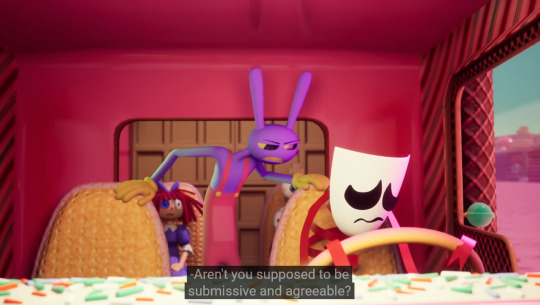
Okay, so yeah, it’s a joke on submissive and breedable. (Don’t give them ideas) But try taking it at face value.
What does he mean by this? Sure, Jax is an asshole, and being a bullied kid is Gangle’s whole archetype… but what if it means a little more than that?
Gangle’s trapped for all eternity this asshole and she’s just letting him boss her around. Zooble can choose not to participate, so no one has to. Why does Gangle listen to Jax at all?
Let's entertain a thought: Is Gangle an NPC?
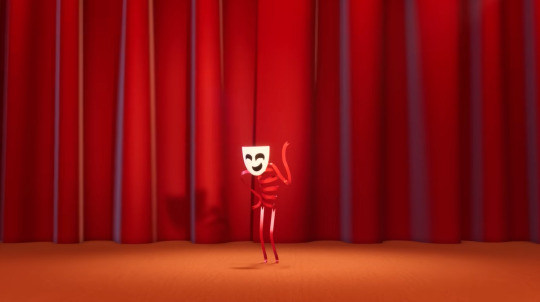
With Episode 2 bringing so much attention to the autonomy of NPCs, it seemed natural to start pointing fingers at characters being this or that. But this isn't just a random crackshot, I feel that there is a story to tell here.
Look back at Pomni’s “orientation” with the other humans. Ragatha, Zooble, and Jax ease her by saying that they’ve been trapped in this world for years and then bring attention to Kinger being the oldest.
But Gangle… she’s isolated from the peanut gallery, busy moping about the broken comedy mask instead.
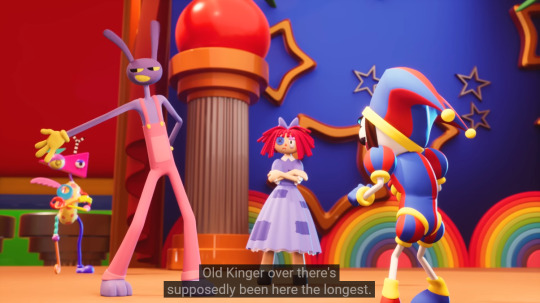
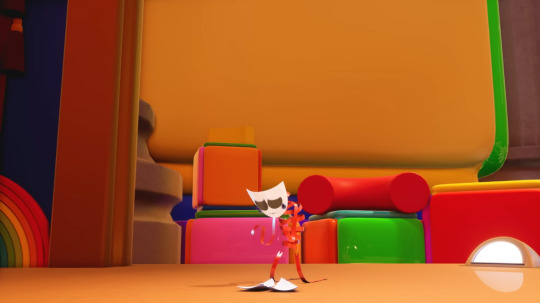
Every character has been given some hints as to how they’ve been coping with the situation. Jax no longer empathizes with anything, Ragatha once had trouble adjusting but now tries to stay happy, Zooble picks and chooses her involvement, Kinger is the eldest and just exists for the hell of it, and Pomni is new to everything.
With Gangle, it’s a blank. No opinion, no hints of her human side, how long she’s been here, no thoughts on the games, nothing. She’s just Jax’s punching bag.
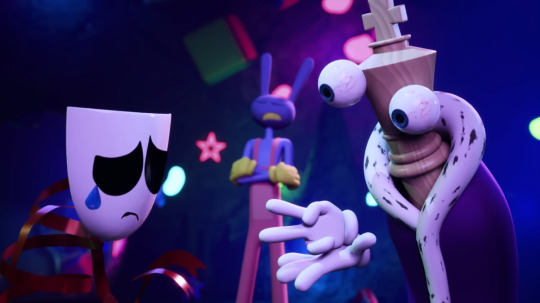
Even Kinger gets a potshot on Gangle in a rock-paper-scissors game…. and he likely forgot that she doesn’t have hands!
And that brings me to another detail. Doesn't Gangle look different from the others?
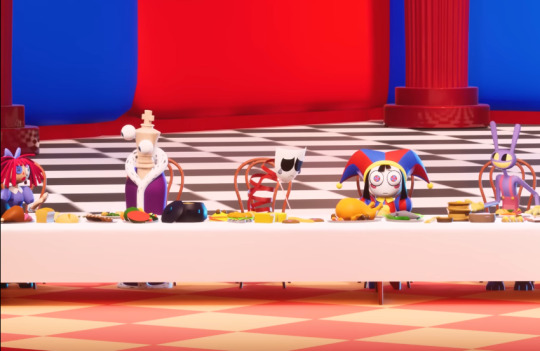
Unlike everyone else, Gangle's just a mask and a ribbon. No hands or legs, or just any limbs in general. She stands out as looking a bit simpler than the others.
Gangle's most interesting design trait is that she's based on comedy and tragedy masks. The ones used old Greek theater to dictate the emotions of their characters.
The first episode seems to imply that with a broken comedy mask, Gangle literally can’t stay happy. Hence why we see her sad most of the time. That's a strange limitation if Gangle's human mind is supposed to be completely intact, especially with how expressive the other characters can be.
It's not delved into too much but does Gangle actually rely on these masks to "feel" emotions?
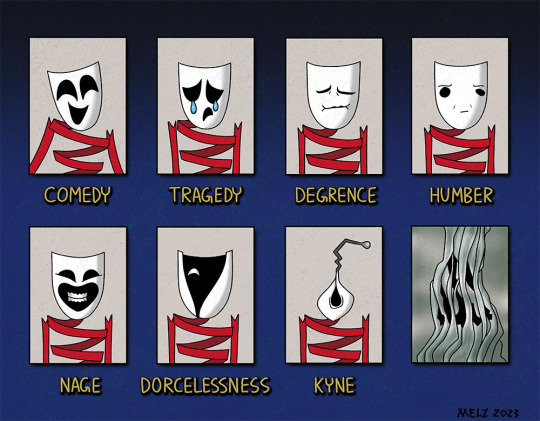
The obvious hole is that Caine would’ve just killed her a while ago if she was an NPC, but he's not exactly omniscient.
He even admits that he has to kill them off because it’s possible for him to lose track.
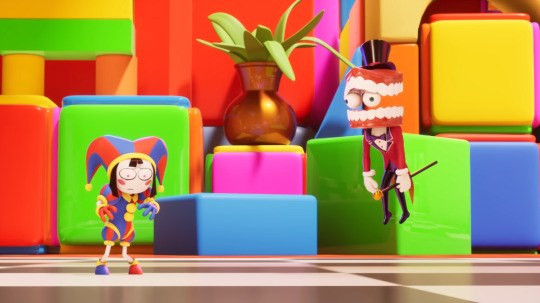
Now normally I could just stop here, but I’m all about the grand statements. You know, the retroactive readings of an episode once you get a theory going. Why does Gangle being an NPC matter at all? How does Ep 2 change?
While deep diving, I realized that the thematic core of Episode 2 is Pomni and Jax’s approaches to surviving the Digital Circus.
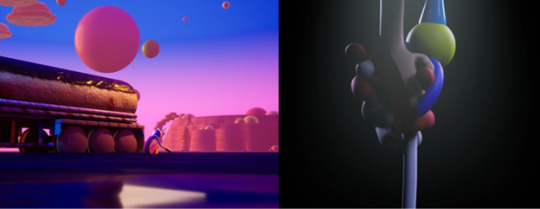
In Pomni’s A plot, we see her connecting with Gummigoo, the NPC that Caine pitted their group against. After discovering him lamenting his new reality, she finds a strange comfort in being existentially lost together. Because in the end the NPCs and the humans are just as displaced and frightened in this meaningless world.
In Jax’s B plot, he forces Gangle to follow some insane orders. Sabotage the game to let the big chocolate turd monster destroy the Candy Kingdom. To Jax, he is the main character. Helping or displeasing this giant population of fake people doesn’t have any consequence for him, so why humor anyone but yourself?
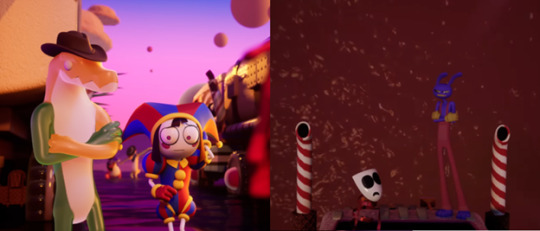
A bit of a stretch, but what if Jax already knows Gangle is an NPC and is keeping it quiet as long as Gangle follows orders, hence the “submissive” comment? He’d be a way more unpleasant character with this reading, but it doesn’t seem off the cards with how he treats everyone anyway.
This dichotomy already plays out well within the episode, but when reframing it as Pomni and Gummigoo vs Jax and Gangle, the parallel is a lot more interesting.
Make an NPC an equal, they die. But keep an NPC under wraps as long as they continue to obey you… they live.

The episode ends with a grim conundrum that NPCs can’t be together with the humans, not because of their differences but because they're just... not allowed to be. But what if one already in the group, proving that they’re just as capable as the humans to play the games and grieve loved ones together?
PS. Despite knowing everyone else's name, I actually forgot Gangle's until I started finding evidence for this intrusive thought. Sorry Gangle.
PSS. I couldn't fit this anywhere, but Gangle's door frame doesn't work as evidence against the NPC theory, because even the mannequins have their own rooms in that hallway.
#animation#the amazing digital circus#character analysis#discussion#theories#tadc gangle#tadc jax#pomni#tadc ragatha#tadc kinger#tadc caine#tadc zooble#gummigoo#tadc spoilers
409 notes
·
View notes
Text
Jimbriel, Satan, the Book of Life, and what it means for Crowley
Acknowledging that what we know so far about the Book of Life from various characters is highly suspect, I'm going to posit to you that Beelzebub is actually the true authority on the Book of Life, and that they bookend Season 2 with very important (and hopefully accurate) information about the Book of Life. With that in mind, let's take Beezlebub's S2E1 description and see how it fits with other canon evidence:

But what does it mean to have never existed in the Good Omens universe? For that, let us look to Satan.
From in-show canon, we know that Adam was able to retroactively change Satan's status as his father to not his father:
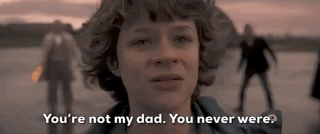
Adam altered reality, although Crowley, Aziraphale, the other celestials, and even Adam himself remember those events from a timeline that supposedly has been erased:

But Crowley nonetheless confirms that this is reality now. Satan was never Adam's father.
Additionally, though not technically in-show canon, we know from Notorious NRG that once Satan became Lucifer, this erased Lucifer from existence in the GO universe:
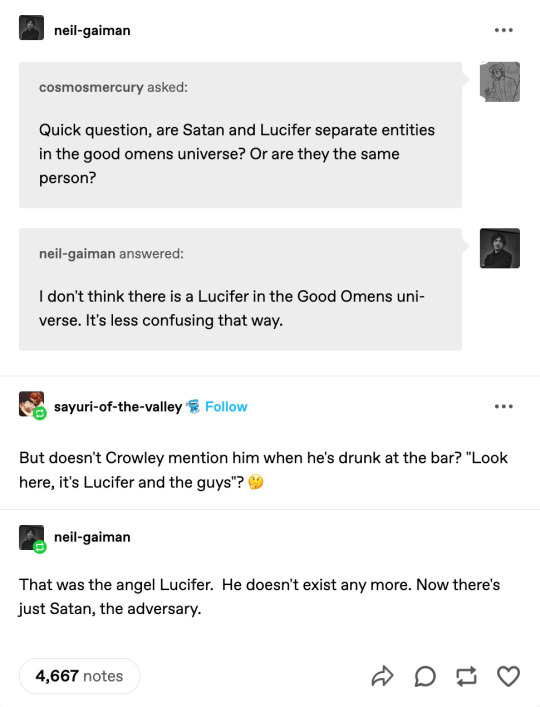
And Crowley's monologue in the bar drives it home; even though Lucifer no longer exists, Crowley still remembers him, and some key events that they were involved in together.
But a more dramatic portrayal of erasure is found in our favorite Good Omens himbo, Jimbo. In the trial of Gabriel, the Metatron makes direct allusion to the fact that Gabriel will no longer be Gabriel after his demotion:

Not "your memory of your time as the supreme archangel will be erased," no, it's:
Your memory of your time as Gabriel will be erased.
Whether he means to or not, Aziraphale reinforces this characterization of memory-loss-as-new-identity:
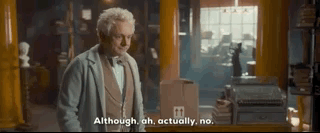
This can be taken simply as a safety measure, but Jimbo doesn't understand it that way and we see throughout the remainder of the season that Aziraphale is very consistent about calling his unexpected guest "Jim," even correcting Crowley when they're speaking privately and it wouldn't blow his cover to call him Gabriel:

But the final word on memory and identity, especially as they pertain to Jimbriel, again comes from our Lord of the Flies, Beelzebub:

All your you is your memories.
Altogether we see that there is significant in-show canon to support a theory that memory is inextricably linked with identity, and that when memory is removed, identity is so drastically changed that the name of the entity must also change... and the person who existed before, with that former name, exists no longer; it is as if they never had.
(But, as we see in the case of Gabriel, they can be restored.)
I told you in the title that this post was about the Book of Life: it is. Everything discussed here about memory and identity must necessarily characterize how the Book of Life operates, at least with respect to erasure. When someone is erased, they don't vanish, but they are so changed it is as if a new person has taken the place of the old, the way Jim took the place of Gabriel, until he got his memories back. But we can surmise that when someone is erased from the Book of Life, their memories aren't conveniently stored in a TARDIS/Ru Paul fly for later recovery. The memories may not be gone, but I'm going to guess that they would be extremely difficult (or impossible) to retrieve.
What this means for Crowley:

I think we need to give this scene a lot more credit for telling us how this universe works. Surface level, it reads as "you don't understand my trauma, and how I've been changed by it." Which is a very valid interpretation. But we can dig deeper and see that, given everything else we know about celestial beings losing their memories, names, and identities, Crowley is alluding to something far more horrific than just the scars left by flaming swords and halo-grenades.
These are the scars of a lobotomy. Something was taken from him, and he is aware of it.
He knows that his memory has been tampered with. Various people (Furfur, Saraqael) tell him that they recognize him, and of things they've done together. He has no recollection of them, but instead of getting agitated, he brushes it off and ignores it. This lack of questions from the guy who questions everything tells us that he already has the answers; not the memories, but the knowledge of why he doesn't have them.
Furthermore, when he's trying to get Jim to remember the something bad and Jim says it hurts, Crowley says:

I know. Do it anyway.
How does Crowley know that it hurts, to try to recall memories that have been taken out of your head?
Because he's been through it.
He has tried to remember, and some memories, like working on the Horsehead Nebula with Saraqael or monkeying around with Furfur, weren't worth the pain. Or perhaps it was pain on top of pain to remember what he had lost.
It is an especial testament to the cruelty of Heaven that he remembers going into battle, but not the bonds he formed with his friends. He remembers a million lightyear freestyle dive into a boiling pool of sulfur, but not the work he did on the Horsehead Nebula, a thing that brought him joy.
And now, the person he loves most in the world, his only refuge from the terror of his empty nightmares, from his malignant and creeping sense of unease that something is missing, has gone back to that place where his identity was so horribly violated that he lost his name.
How will our hero cope?
If you liked this meta, you will almost certainly like my meta on Continuity Errors.
For my thoughts on who Crowley may have been before the fall, go here.
For my thoughts on how this pertains to Metatron, go here.
As I continue to produce metas related to this theory, you'll be able to find them all here.
#good omens#good omens 2#book of life#good omens meta#aziraphale#crowley#gabriel#ineffable husbands#ineffable bureaucracy#beelzebub#ivoc#erasure theory
959 notes
·
View notes
Note
Can u not tag malleus or other characters when u hate on them pls it makes me sad


Hello, and thank you for reaching out about this! I do apologize for your discomfort 💦
I believe that this ask comes as a result of this post, as that’s the most recent post I can think of which might match the description of “hating on Malleus”. You’ll note that there is now a Malleus Draconica critical tag, which you can block if you choose to. This way, you won’t come across it while browsing my blog.
I’ve also gone ahead and retroactively tagged other related posts (although they’re mostly posts from the past year or two). There are similar tags for other characters, such as #Vil Schoenheit critical and the like. These tags are put on posts in which I discuss why I don’t like a particular character. I hope you can use these tags and the blocking feature to best curate your own experience on this blog.
The reason why I elected to make a new tag rather than exclude my posts altogether from the main tags is because I don’t think that it’s conducive to shut away “negativity” about a character when Twst is a game that actively promotes characters of a dubious nature. It encourages us to embrace both the good and the bad aspects of its large cast of colorful characters—so I don’t think there’s anything wrong with pointing out their flaws or why someone might not like X or Y for them. This can make some people uncomfortable, certainly. However, I don’t think that’s a reason to prevent sharing of this critique with others who might gain new insight from it. I say this as someone who has gained insight myself by reading about characters I dislike, and someone who has been told that their works have entirely changed people’s minds about certain characters. It goes both ways.
Even if someone dislikes a character I happen to like, I find it helpful to read conflicting opinions to gain a fuller perspective. I want to give others that opportunity as well. I realize that not everyone may share this sentiment though, which is why there’s always the option to block what you don’t wish to see. (Prioritize your own comfort!!) I think people should be able to choose not to look at content that upsets them, but I don’t think it makes sense for this content to be hidden from others who may be interested in seeing “the other side”, if that makes sense!
I also believe that fandom—especially as of late—seems to conflate critique with hate, to the point where the slightest criticism of a character or content is labelled as “hate”. This can lead to a dangerous area where anything that isn’t immediate and glowing praise is deemed “bad”. That’s not an area I want this fandom to hit, as it would inevitably limit our ideas (although this also applies to all other fandoms).
In reality, “hate” and “critique” are NOT synonyms of each other. Hate is hostile and exists purely to shame or to tear down the content in question. It doesn’t consider the other side or care to ask questions. Critique is judgment or opinion of that content, and it is usually meant to help improve the content. It has us ask “why?” and “how?” To put it simply, hate is “you’ll never be better” and critique is “you can do better”.
In this instance, perhaps the previous anon’s statements (“[…] now I'm a hater. Like wtf. He’s so incompetent.”) are hate. (Even so, they’re entitled to feel the way that they do, even if the way the opinion was expressed was over-the-top.) I do think I was emotional in my response, but I don’t think I expressed myself in a hateful manner overall. I opened with what is arguably a defense of his behavior and then went on to point out a legitimate character flaw Malleus has and how not everyone reading those vignettes would perceive that flaw in a gracious manner. It’s not blind hatred; it’s valid critique and it comes from a place of wanting to see him improve as a person. I try to not character bash because no one (myself included) feels good seeing others hating on their favorites. Malleus has flaws, and so do all the other characters. Those flaws should be acknowledged, and it’s up to the individual to determine whether those flaws result in liking or disliking that particular character.
I’m not saying that everyone should agree with my stance on the Malleus Dorm Uniform vignettes or how I feel about Malleus in general. What I am saying is that not all negative statements made about a character should automatically be categorized as “hate”. I worry that if we stretch the definition of the word too loose, it could become a situation where any and all critique is silenced 💦 What happens when no critique is allowed? Everyone begins to think the same way or has to be fearful of expressing an opinion, and fandom becomes so much less fun for everyone involved… And, worse still, the canon content itself can feel confident resting on its laurels and not actually put forth the effort to “be better” (since there’s no negative feedback coming from the fandom).
Again, I encourage you to curate your online experience!! Do whatever makes you the most comfortable. If you don’t like seeing something, there is zero shame in blocking it or taking whatever steps necessary to disengage. Lastly, please take care to not to overgeneralize what counts as “hate”!
Thank you for your time 🙇♀️ I know I probably rambled for way longer than necessary cnsbjwvuwgejbe
#twisted wonderland#twst#disney twisted wonderland#disney twst#notes from the writing raven#advice#blog update#feedback for the writing raven#Malleus Draconia critical#Malleus Draconia
71 notes
·
View notes
Text
Lily's Need for Control
Lily’s obsessive need for control dictates nearly every aspect of her behavior. She doesn’t just want to be in charge—she wants absolute dominance over every interaction, every space, and every conversation she’s in. The second she feels that control slipping, she either lashes out, shuts down, or disappears altogether.
Look at her infamous call with KP. KP confronted Lily about writing Stockholm, and Lily—who had spent years shifting her story about it—was suddenly faced with someone holding her accountable in real-time. Her response? She panicked. She stuttered, hesitated, and tried to spin her way out of it, but the second she realized she wasn’t going to win the conversation, she bailed. She hung up because, in that moment, she lost control of the narrative.
She also completely forbids independent verification of any of her claims. If she says something happened, her fans are expected to believe it without asking for proof. If anyone does ask for evidence, they’re met with immediate hostility and accused of being a bad-faith actor. Her audience is trained to take her word as gospel, no questions asked. And she needs it that way—because if her followers actually started cross-referencing her claims, they’d notice how often she contradicts herself.
This is also why she refuses to debate her critics. Her public excuse is that it’s a “waste of time,” but the reality is much simpler: she cannot handle a conversation where she doesn’t have the power to silence the other person. In a live debate, she wouldn’t be able to ban them, mute them, delete their messages, or twist their words after the fact. She wouldn’t be able to frame their arguments dishonestly, because everyone would hear exactly what was said. And if her critics came prepared with actual evidence? She wouldn’t stand a chance. She knows this—so she avoids those conversations entirely.
Even in her own voice chats, she micromanages everything. If people start discussing something she doesn’t like or try to fill dead air during a stream in a way that annoys her, she shuts them down. It’s not about keeping the conversation productive—it’s about making sure every discussion happens on her terms. She cuts people off mid-sentence, changes the subject when it suits her, and makes sure the room revolves around her.
But Lily’s control obsession isn’t just limited to her community—it extends to her entire public persona. That’s why she constantly rewrites history and changes her story about past events. If she can retroactively change the narrative, she can always position herself as the victim, no matter how much evidence exists to the contrary. That’s why she purges old posts, edits VODs, and deletes incriminating messages—so she can later claim, with absolute confidence, that whatever happened was just a “lie from her stalkers.”
And when all else fails? She burns bridges. The second someone starts questioning her, she cuts them off completely, smears them, and rewrites history to frame them as an enemy. And it’s always the same cycle:
Person questions Lily.
Lily gets defensive and hostile.
Person realizes Lily is full of shit and leaves.
Lily publicly trashes them, claiming she always hated them.
Lily rewrites history so she was always the victim.
Lily doesn’t just want control—she NEEDS it. Because if she ever lost control, even for a second, her entire house of cards would collapse.
66 notes
·
View notes
Text
Good Omens: on fate and reality
In season 1 of Good Omens, The Nice and Accurate Prophecies of Agnes Nutter, Witch play a vital role in helping to avert the Apocalypse. Anathema dedicated her life to understanding Agnes's prophecies and thereby helping to fulfill them. But in the final episode of season 1, when the package with the follow-up collection of prophecies arrives, she decides to burn them, because she does no longer want to live her life according to the writings of her ancestor.

This is interpreted by many as Anathema taking her fate in her own hands instead of subjugating herself to something that was foretold. But the fact that she burns the prophecies instead of studying them does not necessarily mean that she changed her fate. It is entirely possible that her life will still take the road that Agnes foresaw for her. Agnes probably even predicted the burning of the new prophecies.
The only difference is that now, Anathema knows that all the decisions she makes are of her own free will, while otherwise she would have always wondered what she did because she wanted it and what she did only because Agnes had prophesied it.
A further indication that people acting according to their free will does not contradict the idea of fate is God's Ineffable Plan itself. At the end of season 1, when the Apocalypse has just been averted, Crowley asks Aziraphale: "What if the Allmighty planned it like this all along? From the very beginning?" Aziraphale agrees that this might very well be possible.
So even though all the people involved made their own free choices, they could still have been acting according to a plan God laid out very long ago.
Conclusion No. 1: Free will and fate are not mutually exclusive.
However, it seems that some things can be altered. Adam as the Antichrist has the power to bend reality. He uses it to change the fact that Satan is his father and to bring back people from the dead, for example Lesley. When Aziraphale expresses doubt about Mr. Young really being Adam's father, Crowley says: "It is. It is now. And it always was. He did it."

So Adam did not only change reality for the present and the future, but also for the past. He was able to make things that had already happened undone.
Conclusion No. 2: In the Good Omens universe, reality can be altered, even retroactively.
And the ability to change reality does not seem to be limited to Adam. Another example, as Goldfarb Styrt (cf. p. 127; cited below) points out, is Crowley being able to get himself and his Bentley through the burning M25, while Hastur gets discorporated. Crowley simply imagines that everything is fine, and by imagining it, it becomes real. Goldfarb Styrt (cf. p. 123, pp. 126-127; cited below) also suggests that it might be the individual's interpretation of reality that matters.
That sounds really fitting to me. Because the Bentley is burning, no matter how Crowley imagines otherwise, and it explodes as soon as Crowley isn't concentrating on keeping it together anymore. And, as @indigovigilance mentions in this post, the people who witnessed the incidents during the attempted Armageddon, like Atlantis rising from the sea, still remember them, even after Adam undid everything again.
But Crowley and the humans interpret the aforementioned events in a different way than you would expect, and their interpretations have an impact.

In any case, reality and the ways in which it can be altered are important themes in season 1 of Good Omens. And season 2 contains hints that they might play a big role in the finale as well. The most prominent example of these hints is the recurring mention of the Book of Life.
I will go into more detail about the Book of Life in my next post, but the important bit for now is that by erasing someone's name from it, you create a version of reality in which "they will never have existed". So the Book of Life is another tool to effectively alter reality.
Conclusion No. 3: Reality and the possibilities to alter it are important themes in Good Omens and will be relevant to plot of the finale.
That's it for now. What are your thoughts on fate and reality in Good Omens?
Work cited: Goldfarb Styrt, Philip: Sola Fide. Ineffability, Good Omens, and the Reformation. In: Giannini, Erin and Taylor, Amanda (Eds.): Deciphering Good Omens. Nice and Accurate Essays on the Novel and Television Series, pp. 120-132.
@kimberleyjean
#good omens#good omens meta#the nice and accurate prophecies of agnes nutter#good omens 3#good omens movie
66 notes
·
View notes
Text
So, about Good Omens:
It's still good, guys.
Like if you didn't like it before, that's fine. But if you loved it then, and now you suddenly think it's bad, you're lying to yourself. Not on purpose, but your brain is trying to reconcile what you've learned about the author with what you felt before. Understandable, it's trying to avoid contradiction.
But that isn't how it really works. In reality, toxic traits of an author do not retroactively poison their work. That's why we talk about separating the art from the artist.
Anyway, this isn't about NG and it never was - he's said as much himself, several times. This is a promise he made to a friend, and whatever else you can say about him, that friendship was real. He damn well better keep his promise. This story changed lives, minds and hearts, and it deserves to be completed, for its own sake and for Terry's, and that's that on that.
(And no, we are not going to get a magically pure Season 3 without NG involved. It'd be nice, but it's not happening. The facts are that no one else knows what they planned together, and the screen version wouldn't even exist if not for NG and that promise. Besides, he's already written the script. Remains to be seen whether he'll be on set at all, but he is involved, and that's that. We can either enjoy something beautiful from a problematic creator, like we always talk about on here, or we can't.)
#good omens#on the separation of art from artist#engaging with media in a complicated-ass world#don't feel bad for still loving it. you shouldn't. it's beautiful#don't feel bad for wanting it to be finished. that's what he wanted too#I'll watch it for terry david and michael#and everyone else who's made it so amazing#anyone who doesn't want to engage with it anymore should unfollow me (no offense taken)#bc once set photos start dropping I WILL be back on my bullshit
142 notes
·
View notes
Text




And in this week's post for DR: Demix, I'm finally sharing a concept I've had stewing in my head for a while now. A tale of not one, not two, but THREE JUNKOS! Yay!
In DR: Demix, there are 3 Junkos, the reason why is that I wanted Ibuki to have her own little Izuru form, and I thought the perfect equivalent of that was Junko. But to make it work, I needed to retroactively change a lot of stuff, and it was a really fun process ngl. And things got complicated regarding whether or not Junko in DR1 even is Junko at all, so I thought I'd add a little fun tidbit to that too.
"Junko Enoshima" in Demix 1 is Ryoko Otonashi, and the name is just a nickname people gave her in reference to the founder of HP. She takes up the name when Mukuro dies and she goes ballistic, like Kiyotaka becoming Kiyondo.
Junko Enoshima in Demix 2 is the founder of Hope's Peak. An anarchist revolutionary who was granted the opportunity to make a better world and kinda flubbed it because she was a teenager.
The "Junko" Project in Demix 2 is also the hyperactive and insane Mastermind" of the killing game, created in a secret project by disgruntled student geniuses, Ibuki was transformed into a sick reflection of HP's founder and manipulated to becoming a pawn of Taka's... but not really.
Junko 1, the Titleholder - The first Junko is the one we know and love from THH, but that is not her real name. Ryoko Otonashi - the Ultimate Moral Compass - is her real name, and "Junko Enoshima" is just a nickname given to her by the hopeful youth that see her as the successor of the revolutionary woman who founded the school of Hope's Peak itself.
In reality, this "Junko" is no more than an opportunistic teenager, who thinks the name is... weird, at best. Reveling in the popularity and opportunities she's given as the so-called "reborn Junko" to cause chaos, even if beneficial chaos, to every school she is shipped off to after setting the last one ablaze with riots and protest in the name of her vision of a right and just world.
It's not until she experiences an unimaginable loss in the events of Demix 1 that she fully embraces that nickname in a bout of insanity. Swearing to burn the school down to its foundations with everyone inside, promising through running tears that she would accomplish it, any means necessary to avenge her sister.
Junko 2, the Founder - The second Junko is seen in an old busted portrait taken about thirteen years prior to the events of the despair, and she is the revolutionary founder of Hope's Peak. An anarchist leader, she was the first truly identified ultimate. A revolutionary, quite literally, Junko used her incredible talents to bring Imperial Japan to heel in the second world war, starting a prolonged anarchist revolt that would only be quelled when offered to change the system from within, the government granting amnesty, infinite travel funds, and most importantly an institution made in her name where she could support the youth: Hope's Peak Academy.
Ultimately, it was a mistake to take the government's deal, as her efforts to spread revolution worldwide were quashed and Japan restricted her freedoms until she was an old woman who had hardly the energy to walk around the school she founded herself.
Junko 3, the Mastermind - Not forgetting the dream of their founder, many students united clandestinely to discuss the future of their school despite neverending scandals and reports of corruption. With their founder missing, they created a project to rejuvenate the school under a perfect vessel: an ultimate revolutionary of their own. One with every talent under the sun needed to retake the school for themselves.
A council of sixteen students at the head of the project did their best to transform reserve course student "Ibuki Mioda" into their savior... only for her to end up a completely out-of-control maniac.
"Junko" is a hyperactive monster, her only limitation being what her genius mind can come up with. She is constantly in a state of bliss as whatever desire Ibuki once had in that mind of hers was accomplished, even if she doesn't remember who she was anymore. And she lives to revel in that fact, to enjoy her talents now and forevermore, as it is the only thing she has of her old self to cling onto that makes her feel whole.
#danganronpa#fanart#danganronpa demix#talentswap au#talentswap#mani e.#danganronpa 2#danganronpa 1#danganronpa thh#junko enoshima#junko#ryoko otonashi#kiyotaka ishimaru#mukuro ikusaba#ibuki mioda#mastermind ibuki mioda
79 notes
·
View notes
Note
so i've been curious, feel free not to answer, but the fact you're so insistent upon people not referring to you as a kirby, but you're still a kirby fan, and knowing what your model looked like once upon a time... did you get a c&d and that's why you made a change? i hope i'm not being disrespectful, if i am i'm sorry!
no, there was never any cease and desist from nintendo, but with the way they operate now-a-days, im glad that i had the foresight to change into something that a lil more inspired and original. (well... emphasis on the inspired LOL)
actually, quick lil rant if you'll allow me: i am incredibly insistent to folks very much not referring me/my vtuber directly as a kirby for a reason. i did, at the very least, tried to take the time to make something a lil more original for the art of streaming as a vtuber, but it can certainly be frustrating when folks are constantly saying to me "OH YOURE A KIRBY". i think if people can recognize that its more inspired by the things i enjoy, then that's usually a lil more along my speed. it's, for sure, a lot less frustrating LOL
at the same time, i do have to acknowledge the shortcomings of my own design process at the time - certainly when i made my current design (which was concepted back in december 2020), i did not have the skills necessary for memorable character design. i could have done something that would have made the character a lil more visually distinctive. that's on me and i can absolutely recognize that.
i guess the funny part is that ive got a "V2" design that ive been sitting on for a couple of years now. the unfortunate reality is that, as ive said before, i am just one dude who still needs to stream 5 - 6 times a week to try and make rent. sometimes there just isnt any time to work on the redesign/making a new model/prepping for a total visual overhaul of the streams.
with that being said.... if you wanna know more about how i went about the design process for my character, you should check out this post i made a while back. i think sheds some light on how things worked and, retroactively speaking, didnt work out
and that's it! sorry about all the text. i guess it's just been weighing on my mind for a bit, especially since ive wanted to just rebrand lately no questions or prep about it. maybe one day ill have the bravery
44 notes
·
View notes
Note
You had found a reality altering app that could make anyone you targeted bigger. Not thinking it would work you jokingly requested the app to make your perfect girlfriend 1,000001 times curvier over the course of a year. Now everyday, her ass and boobs become way bigger than she already was. Retroactively doors become wider, clothing becomes stretchier, and she's become more famous. You check the app again to see what went wrong. It turns out the app never registered the comma in your request, meaning over the course of a year she will grow a million and one times larger. She doesn't even seem to realise how the world around her changes to accomodate all her curves. Looking down at yourself, you realize those accomodations are also extending to you. There is a reason you're still her boyfriend after all, you're the only one big enough to fit her.
Check in what went wrong? I think it's more like checking in what went right! Why didn't we think of this before? With an app as powerful as that, that could supposedly really alter reality, there's really no point in just going with such a tiny number, instead of making massive changes that really showcase just how much power that thing had.
Also...with just doorways and clothes adapting to her growth, then the expansion is starting off slow and she's absolutely about to have some gigantic growth spurts - because a 1,000,001 times bigger over a year means an average growth of 2739.73 times bigger than her original size per day, rounded up... so if she's only doubling in size every day, there's a LOT of growth to be had. Like a LOT.
She's even saying that something has changed in me, like how huge I am, even if I don't feel anything different! I only meant for her to grow, although apparently there were options that extended to pleasure rates and things like that, which I just kept at default when doing that funny little expansion number that 'backfired' in a very good way...
I can't wait to see how reality will adapt itself to how gigantic WE will be. Everything will have to change to acommodate millions of pounds of hyper endowed flesh, the most absurd curves seemingly possible...and that's if she doesn't find out about the app and do something with it...or if I don't decide that she's not growing fast enough~
I wonder if we're going to become bigger than mountains, how reality will possibly rotate around us when we get to such crazy sizes... Maybe they'll start selling or giving us free compression clothes so that we can be at more manageable sizes, and maybe we just get teleported to an empty spot whenever we take them off as to not destroy everything directly next to us in a quite large radius.
Maybe there'll be mountains themselves dedicated to us and our size, where we can head inside without any issues... Like imagine skyscrapers just becoming mountain ranges because that needs to be the new norm for the world to adapt to us.
As for clothes, I'm totally fine with having impossibly stretchy, basically infinite fabric covering us, if it feels good and looks nice, though going naked is always fun, and I'm sure society won't mind one bit, especially at our size...assuming they even notice and think it's something out of the ordinary, because reality might have been warped in a way that it's normal to them too...
Now, to add more zeroes to the end of that 1,000,001....
36 notes
·
View notes
Text
instructions for a funeral.
dialogue prompts from instructions for a funeral: stories by david means.
to reckon with loss is to reckon with what hasn't been lost.
how are you feeling? what are you thinking?
let's get this started so i can get home.
you've had good luck along the way, but it was only luck.
you have to win, however you have to win.
justice doesn't seem to be factoring into it at all.
only winning makes it a good fight.
where'd you come up with a word like that?
i love you anyway.
that needs to be stitched.
cute as a button.
stop. no more warnings.
keep looking. don't ever stop.
your time's not up. your time's not even close to being up.
you can only see me the way i am now.
i'm exposing myself as problematic.
if we're caught, we're caught together.
you're as kissable as you are killable.
you can't make that kind of shit up and get away with it.
i loved you like a brother.
you can't put too much of yourself in the story.
it's a feeling that never leaves you. you carry it with you for the rest of your life.
i feel completely separated from earthly reality.
that's speculation. though it makes perfectly good sense.
you were sympathetic without being judgmental.
you really seem to care.
the score between us was already even.
precise memory vaporizes when it comes into contact with cash.
i don't know the password.
i've come in search of the truth about a matter.
you have honest eyes.
someone has to pay, somehow.
i didn't do anything you wouldn't do.
i'll have to kill you, if you keep talking like that.
you're a dreamer. you have stars in your eyes.
how could you dream this up?
this is a fitting place to end this thing.
you seemed like you needed help.
i'm not sure i even have words for it.
i've heard all i want to hear about _____.
have the wisdom to hold your tongue.
mutinies are out of style.
i didn't say a word.
any one of us might have done the same thing.
you'll come back, won't you?
something big is coming. the wind's changed.
if you know the truth, you shoot first.
fate operates retroactively.
what can one man know about the inside of another, without making something up?
what were you thinking about out here?
i was extra polite.
49 notes
·
View notes
Text
It's not a lake, it's A. Wake

In the introduction post I’ve made when I’ve just created this blog, I put a few points, that I consider pretty telling of what kind of theories one might see here. One of them was “Alan is the ocean;” meaning, of course, that Alan is the Dark Place. And it has nothing to do with metaphors or tortured madness of his mind.
Alan is the ocean because Alan was connected to the Dark Place long before the whole Bright Falls ordeal happened. Sadly, it’s very hard to tell if the Dark Place existed at all before Alan or if it was retroactively written into reality; I would assume that it did exist at least as a primordial ocean: we have Ahti as a testament to the Dark Place being (a part of?) a primordial ocean and Door as a testament that it is the In-Between. Both of those entities stand out even in the Dark Place, not bothered by its shenanigans, and seem to be pretty comfortable — chilling on the streets of the Writer’s city or dancing with the mop. If anything, both of them showed that they are more disturbed by their time in our world. Ahti has a breakdown in Valhalla, and Door even left his loved ones in a questionable manner to get out. Yet, there are some hints that the Dark Place might’ve been at least shaped to what it is now by Alan. We’ll get to it.
So, how does Alan fit into the narrative of being the primordial ocean, the Dark Place, the In-Between and the Master of Many Worlds, if he (doesn’t even remember his own birthday) wasn’t born before the late 70’s? Door was a man grown in the 80’s; Ahti was kicking in the 60’s, as we learn from the Control’s Foundation; Cauldron Lake gave a headache to the natives centuries ago — all predate even Alan’s birth, let alone his ability to make a coherent story. Well, let’s explore this.
The main question here is: what is time for the Dark Place. I would say it’s just a suggestion; the Dark Place may or may not recognise this concept as something meaningful, but surely refuses to follow it as a rule. We see confirmations all over: in the first game we are shown the clock, that runs backwards, changing the events of the past and hiding the ultimate loop from us, in AWAN we have Mr. Scratch, who sends Alan back in time per the rules of the story; in the second game… what is there that doesn’t defy time, really? “Everything happens all at once and never” is as true as “tomorrow will never happen,” because the time is an idea, most likely, introduced by Alan himself not to go crazier than he already does, hence the wordplay and semantics are important.
But let’s look at what was for sure rewritten retroactively and shown us without the need to piece together hints and come to this conclusion (I am looking at Tom Zane right now and might lightly go into “who wrote whom” this time). We for sure know that the ultimate loop of the first game happens behind the screen: Alan sits to write with the last page in the typewriter, and the last page is this:
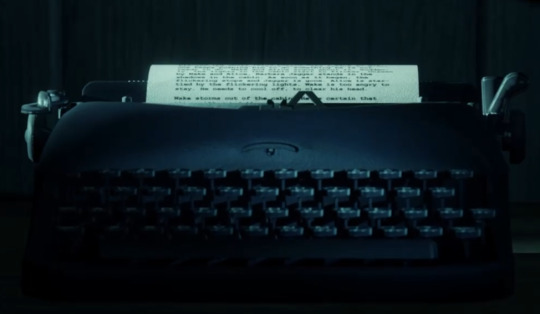
Not much text can be seen here, but there is a full version of it:
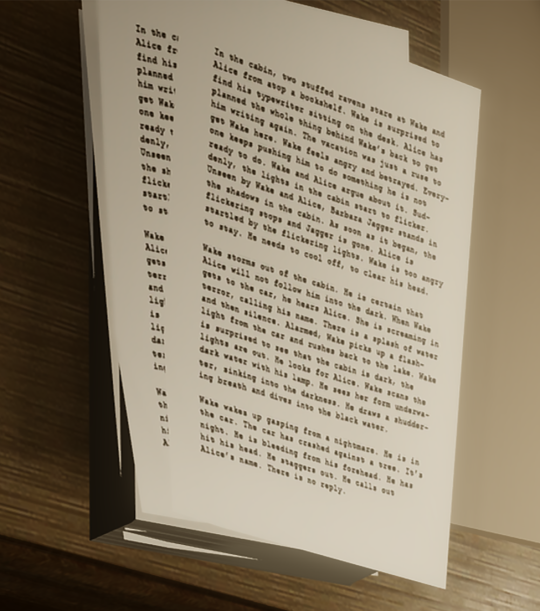
It’s a bit hard to read (hashtag FreecamForRemastered), so here’s the text:
In the cabin, two stuffed ravens stare at Wake and Alice from atop a bookshelf. Wake is surprised to find his typewriter sitting on the desk. Alice has planned the whole thing behind Wake’s back to get Wake here. Wake feels angry and betrayed. Everyone keeps pushing him to do something he is not ready to do. Wake and Alice argue about it. Suddenly, the lights in the cabin start to flicker. Unseen by Wake and Alice, Barbara Jagger stands in the shadows of the cabin. As soon as it began, the flickering stops and Jagger is gone. Alice is startled by the flickering lights. Wake is too angry to stay. He needs to cool off, to clear his head. Wake storms out of the cabin. He is certain that Alice will not follow him into the dark. When Wake gets to the car, he hears Alice. She is screaming in terror, calling his name. There is a splash of water and then silence. Alarmed, Wake picks up a flashlight from the car and rushes back to the lake. Wake is surprised to see that the cabin is dark, the lights are out. He looks for Alice. Wake scans the dark water with his lamp. He sees her form underwater, sinking into the darkness. He draws a shuddering breath and dives into the black water. Wake wakes up gasping from a nightmare. He is in the car. The car has crashed against a tree. It’s night. He is bleeding from his forehead. He has hit his head. He staggers out. He calls out Alice’s name. There is no reply.
And it already has differences from what we learn in the playthrough of the game: Alan never got to the car; Alan had a flashlight on his person; the screams were heard all the way to the cabin; Alan got into the cabin, not scanned the lake; the car didn’t crash against the tree. All those little details, they are all wrong for us. Most importantly, this manuscript is written in third person and present tense, when all of the manuscripts we can find in the first game are in first person and past tense (if the POV character is Alan, of course). It’s not a Departure we play, it’s the Departure that Alan wrote to allow Alice to escape.
This page flash is followed by the clock going backwards and the time adjusting itself to the moment when Alice is surging up from the lake. She also tells us in the second game that her stay in the Dark Place was a bit different:
“I remembered being trapped inside that lake, a dark ocean with echoes of myself, my fears, my photos. Inside a dark tide of madness. The same events and images, looping again and again. And then I saw a light. Your light. You dove in just as I swam out.”
…than in the manuscript that Alan wrote in his penultimate loop in the first game:

We can assume, he rewrote it to keep Alice’s sanity intact. She did, after all, have a nyctophobia, and just being trapped with a malevolent darkness around — for her — will be worse than looping with photos and events, even if he couldn’t completely protect her from fears and dark madness, he had to stay true to the concept of the Dark Place.
But, again, this might be reality retroactively rewritten or the memories rewritten; the clock and the cutscene of Alice being dragged into the lake are enough to know for sure: Alan can and does rewrite the past.
Alan can toy with time by writing loops into reality less subtly. In AWAN his whole winning strategy was to exhaust Mr. Scratch with loops and prevent him from killing Alan by rewinding time (might not be the first time; surely not the last). The whole plot of AWAN is the proof that time is a weapon and an effective one: loops are not designed to run in circles or start fresh every time, they can be consciously used and abused by Alan to reach his goals. He can rewind, he can start fresh, he can start from the particular point in time, keeping the allies’ memories intact, he can even pull radio-shows from other nights just to hear how his loved ones do. He can also mess everything up, and the reality together with the Dark Place will put things into place. In the “Emma Sloan” manuscript, we have the date:

In the “Lost in the Dark Place” manuscript, the time spent in the Dark Place:
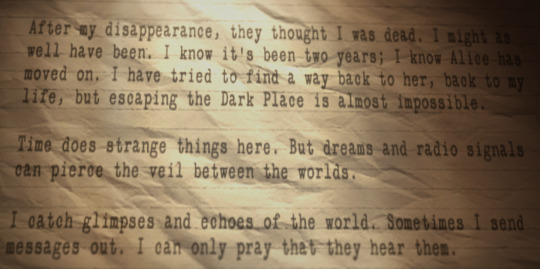
On the radio, Alice agrees with the two years:
“It’s been two years. I— this sounds awful, but yes, I believe he’s dead. Otherwise he would’ve... well, you know.”
You might guess what the issue is here. Alan could not be missing for two years in 2011; he dove into the lake in September of 2010, even if it’s the very end of 2011, he’s missing for only one year and three months. Yet, this ussie was glanced over; or AWAN, contrary to my belief (and Alan’s), actually takes place in 2011, and Alan pulls the interviews from a very far future. Both possibilities prove the point: time is just a suggestion. In fact, it might be a suggestion so much, Alan is lost in it completely. 2011 and 2012 merged into one thing in his mind, and writing and the Dark Place delivered.
There is also Control’s AWE where the alert goes off far in the future; it’s just one of the things that can suggest the time being bent, I will not go into details about the others, since they are not as solid as this one.
In the second game… boy, do I really need to talk about time there? Allow me to be as short as possible: between each draft of Initiation Alan goes through the loop of Return, that resets again and again: we have loops within loops, and our reality, the world bound by the laws of time, waits patiently when Alan will finish walking around Noir-York, collecting echoes, watching Night Springs, and dancing in his musical, just to rewind to the very moment Nightingale crawls up from the waters of the lake. In one playthrough we can see Alan being shot with the bullet of light at least four times. And one playthrough where Return happens four times takes, let’s say for convenience, a week. The first playthrough is not the first big loop of Initiation-Return Alan goes through, it’s not even the first with Saga Anderson as a hero; she, too, is stuck there for multiple loops already (immunity to the story, my arse). How much time Return ignored while our world was frozen? Who knows! A lot.
Just to hammer it down, let’s also throw in the Time Breaker episode. There time was broken so much, eternity lost its meaning. It is a failed story, I want to stress it, nothing from there made its way into reality in anything more than echoes, but the very fact that Alan can write something like this is telling. He also didn’t fail because of this tremendous amount of time he chose to ignore, the time spent as a tree or hanging on the tree wasn’t an issue there.
And, as the last nail in this coffin, that you can choose to ignore: AWR might or might not be yet another set of loops of the first game: Alan did add the Coffee World and other things he needed to establish for Return, effectively rewriting the past.
All of this paints a pretty clear picture: Alan is above and outside the very concept of time; time is his tool, a point in the story, a toy.
Now, let’s forget about that for a moment and talk about Alan’s life before he encountered Barbie as the Dark Presence. His previous works matter. There are several things that point to him being able to affect reality before 2010 (however many 2010’s he looped through).
Known works of his, that are canonically confirmed being written before 2010 are: the Errand Boy story, the Alex Casey novels, the Night Springs episodes “Over the Threshold, Darkly” (the Control one), and whatever the name was before Alan adapted the episode into AWAN’s “Return,” plus a number of others, that are not specified to my knowledge (yet, we can guess some from the ones that are featured in the first game). All of them, one way or another, are connected to reality.
But before we will talk about it, I want to note one thing. The assumption that Alan is… not a “creative writer” but merely a clairvoyant stenographer of sorts, due to his inspirational visions in the second game is quite popular, yet I strongly disagree and would challenge it. In short, every writer, in one way or another, takes inspiration from reality or other fiction (that was inspired by reality), it’s a given and doesn’t make someone a mere stenographer; we have solid evidence that the events of the Alex Casey novels are different from the life of the real FBI agent Alex Casey; the visions are short plot ideas, meat on these bones must be added for it to be a proper work of art; the Dark Place does not realise any fiction that is not a genuine act of creation:

Therefore, no, Alan is not a clairvoyant stenographer, he is a creative writer. And a good one for that matter; at least I had a blast with “Errand Boy” and an excerpt from “Return to Sender.” With that out of the way, let’s return to the point.
From the works we know, the “Errand Boy,” probably, is the weakest argument, but it did contribute to the Bright Presence’s role (if not even existence), yet it was realised too close to Cauldron Lake and probably pretty deep into the loops, so I won’t go into details with it.
The Night Springs episodes, on the other hand, are somewhere in the middle. We know that all of them were written at the very beginning of Alan’s writing career:
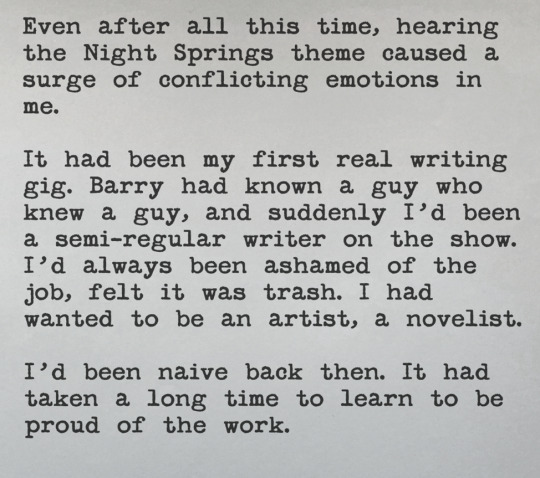
And some of them were realised (or foreshadowed, if you chose to believe that the episodes from the first game have one or two written by Alan, as I do) in the past. Now, I know this is a touchy subject for the community, but at this point, I think, the bigger confirmation of Control being Alan’s work, can be only Remedy’s statement, which reads “Alan wrote the events of Control.” The script of “Over the Threshold, Darkly” is the start of the whole Hiss ordeal and the establishment of the Federal Bureau, which deals with the paranatural, as well as Trench’s (and, one might argue, Darling’s) fate. And if the Hiss and Trench (Darling) at the moment of the writing could be years away from the events that were described, the FBC might or might not have been momentarily turned into what we see it as.
There is also this tricky reversed part in Balance Slays the Demon, that was written for AWAN:
It will happen again, in another town, a town called Ordinary
One can choose how to interpret this line, of course, but we can be certain: the boys are doing their seer/connected-to-the-Dark-Place thing and sing about the truth, that will be. Now to the interpretations. We can take the context of the song and assume that in the Ordinary the “Balance” (Hedron/Polaris/Jesse) will slay the “Demon” (Not-Mother and her bunch). We can take “it” as “AWE” or “the overlap,” meaning the Altered World Event will happen there; an overlap, similar to the one in Night Springs, Arizona, will open. Or we can infer that, given that the song is playing in AWAN, yet another script for the Night Springs will start to come true in the past in the town of Ordinary: the setup for “Over the Threshold, Darkly,” or there might be a different one. Or all those together at once might be true.
The line also could be written off as a teaser for This House of Dreams, since it promises a future event, not stating that something already happened. But here comes this whole thing about the concept of time: we already established that the Dark Place couldn’t be bothered by it. In RCU the concept of something happening in the future for something to happen in the past is as logical as it is for us in reverse. The future influences the past as much as the past influences the future.
There is yet another moment when Alan’s works might’ve played a major role. Mr. Scratch’s involvement in the story. Was he truly in Departure, or was he introduced in the script that was later turned into AWAN’s “Return”? Or was the episode of Night Springs “Man in the Mirror” written by Alan, and that’s why we were treated with Mr. Scratch? The personality of the double in the episode surely matches the sadistic playfulness we see in AWAN.
Let’s move to the Alex Casey novels. In the dialogue between the FBI-Casey and Alan, we learn that the books have, as Casey himself put it, “echoes” of his life, as if he were watched. And then Casey says a peculiar line, reminiscent of the Hitchhiker’s:
“You think you’re God? You think you can just make up stuff? Play with people’s lives and kill them when you think it adds to the drama?”
It goes like this:
“I think you like using people, Wake. Taking their lives and twisting them into your stories. And when someone gets hurt, it’s kickass material for the next one. […] This is not your playground. And I’m not your fucking creation.”
The answer to this is even more curious, but let’s take this apart first. Casey is clearly upset (he even spills his coffee!) and trying to prove that he’s not Alan’s creation. It goes a bit against what he said about echoes: if he felt that he’s being watched, then, surely, the logical conclusion will be that Alan is a creepy stalker, and Casey needs to file for a restraining order (or not, the Alex Casey series is finished; some other legal action maybe?). But for some reason Casey flairs up about using people, getting them hurt, and then using their pain. Why is that? Did he check the dates on the publishing of the books and the events of his life that coincide with what is depicted there? Casey gives us nothing concrete, but the two last sentences heavily hint, that the fictional Casey went through things before the real Casey experienced them himself. Alan, most likely, didn’t create FBI Alex Casey per se, but he did influence his life with his writing.
The response Alan gives to Casey’s outburst is very telling:
“It doesn’t work that way. Even in the Dark Place, where the rules hardly apply, it’s very complicated to make fiction come true. I saw visions of what’s happening, what will happen, dreams. I tried to use them in my writing. I understand how dangerous it is now, even with a paralyzing amount of planning. I think I stopped writing. I think I gave up. But there’s a manuscript. Maybe I forgot not to write. The Dark Place makes you forget.”
Yeah, real cute word-salad, Alan. What I want to draw attention to is this line:
“Even in the Dark Place, where the rules hardly apply, it’s very complicated to make fiction come true.”
Even in the Dark Place… so, what about the outside of the Dark Place? More rules, but, you know, in general, it’s kinda a thing? A bit more hoops to jump through, a bit more fidgeting with the Clicker, a bit more annoyance, but you’ve been there, done that?
He does follow up with “visions,” but at this point it’s very hard to follow — what he’s talking about: the Dark Place or the real world before the Dark Place? Or both, because he’s confused and his head hurts? While I’m not going to claim that Alan is not a capable parautilitarian, who, indeed, can peek into other people’s lives and dreams or even other dimensions and could see into Casey’s future this way, it doesn’t change that, if taken at face value, he kind of admitted to being able to make fiction come true even outside of the Dark Place. Allow me to make an example, so we are all on the same page, let’s say one is playing basketball and states, “even in training, where the rules hardly apply, it’s very complicated to dunk.”
Let’s also not forget that Casey is not the only FBI agent whose life was in one way or another affected by the Dark Place and Alan: Finn, Robert Nightingale’s partner, went missing because of some “craziness in the east” at least some months before September of 2010. Did Alan write it? We don’t really know, since not much in general is known about Robert Nightingale, his partner, and his motivations; but somehow the agent was convinced that Alan is at fault for the “craziness.” We also don’t have more examples of Alan’s previous works to claim this was realised through writing. But he did somehow influence what happened with Finn and Nightingale long before Bright Falls and from outside of the Dark Place. We are not talking AW1 or AWAN level of “outside of the Dark Place,” because all the fiction (or visions) that came true in those games was created inside the Dark Place, and after Alan was already tightly connected to it…
Or was he always? Herald of Darkness, really, is such a gem. Let’s take a look at what the boys have to say about it with their “visions of what’s happening, what will happen.” We will skip through Alan’s and Door’s parts, after all, if you reading this, there is a chance you know them well enough or at least know where to find the lyrics.
On the nightmares, the Clicker and being drawn to stories:
C'mon in and listen Lost words you've been missing Of the fire you're bearing The eye of the darkness, your light […] So here is a clue Of hope to remember Visions, they come true Obeying the light switch too
It’s all about baby-Alan (according to the manuscript from the Well-Lit Room — 7 y.o.), who was still waking up in the middle of the night and couldn’t sleep, because he was horrified. The eye of the darkness — his light? Visions come true obeying the Clicker? By the way, we are talking about a kid who’s suffering from a rare congenital condition, that makes him overly sensitive to light. He is blinded by bright light and prone to migraines, as stated in the guide to the first game. Almost like those Taken that lived through the first game and then were suffering severe photosensitivity per “The Alan Wake Files.” This also heavily enforces that Alan’s line “even in the Dark Place, where the rules hardly apply, it’s very complicated to make fiction come true” can be taken literally: it is hard and complicated, with a bunch of rules, much more so than in the Dark Place, but possible in the real world: visions, they come true.
Now, allow me to digress a little, because we need to explore the Clicker very briefly. Alan described it to Alice as a source of a magic light, that can make nightmares go away; in the first game it was a source of a magic light and a key; in the second game it became an amp as well. With the source of a magic light, everything is pretty simple: Linda Wake, Alan’s mother, convinced him about that, using his father as an argument — everything of his father’s took on mythical proportions in Alan’s mind. We see this magic light thrice: when Alan clicks the night away in the Well-Lit Room:

When he summons the Bright Presence in the apartment, and when he “fills [the Dark Presence’s] heart with light”:
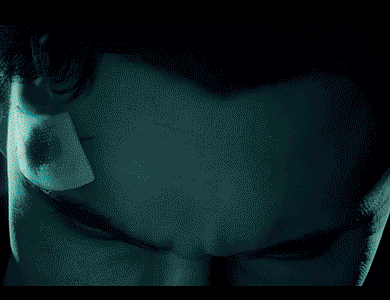
Yup, Alan’s first OoP, that he created is a glorified flashlight.
The Clicker as the key was established by the boys of OGoA in The Poet and the Muse:
And now to see your love set free You will need the witch's cabin key Find the lady of the light gone mad with the night That's how you reshape destiny
And Alan did use it as a key in a way: he took the Clicker out before jumping into the lake. Considering how the first game was stressing the “key” quality of the Clicker, an argument might be made, that without it in hand, Alan would just crash onto the waters below, and only the possession of the “key” allowed him to enter the Dark Place instead of expiring. In the second game, the Clicker suddenly became an amp; who exactly decided on this quality we don’t really know, I would bet on Scratch (Alan will follow any belief Scratch has, since he himself doesn’t remember the truth anyways), but Alan agrees and the boys, too. Funnily, one might say it was used as a key more in the second game than it was in the first: Scratch opened an overlap with it, letting the Dark Place to seep into our world, then it was used to close the overlap with the new ending of Return (not to mention what had happened on the shore of Cauldron Lake). Why do we need to know all this? Because, no matter if the Clicker, aside from being a glorified torch, is a key or an amp, little baby-Alan, seven years old, was either closing and opening his connection to the Dark Place, the source of his nightmares (as the AW1 episode one “Nightmare” shows), and a powerful reality-bending dimension; or through the amp quality of the Clicker could make the visions come true.
So, the boys in this part of the song spelled it for us: Alan was at least connected to the powers of the Dark Place and his light was the eye of the darkness.
Moving on. On getting famous and fame’s impact:
The story's the end-all A piece of true fiction Made meaningless in The face of creation […] Fighting the nightmares Torch and a light switch A gift or a curse A reality made of dreams
The story, as far as I understand now, is the last Alex Casey novel, I might be wrong, so we will skip it — there are other ways to look at those words. But “fighting the nightmares with a torch and a light switch” and “reality made of dreams”… well, that sounds an awful lot like Alan’s already in the story! And the torch here is a metaphor or a flashlight? Actually, both will do. The reality is already made of dreams; and it’s not only about Alan’s dreams coming true in the most cheerful and nicest meaning.
But in the last part there is much more.
He could write a new story Like Tom Zane before him And maybe they'd be happy once again
Tom Zane, as we know from This House of Dreams, wrote a story for him and Barbara to have a private island in the Dark Place, where they can live their happy-ever-after. The problem here is: we are not yet at the point in the song when Alice will be kidnapped, it’s still what could be instead of the whole ordeal with the Dark Presence. One might interpret it as “if Alan would just write a new book, they won’t be in need of a vacation in a place with a shrink,” but Tom’s name is there. And the only story, to our knowledge, that influenced the happiness of Tom’s and Barbara’s was the Last Poem, that was no mere poem, but a story that shaped the Dark Place. Which, again, points out that Alan could make fiction come true before Bright Falls by just writing away all his and marriage’s problems.
Still he's the torch bearer And it couldn't be much clearer A war needs its warrior, true and right But the darkness within him Held her hostage Had he seen her drowning Would have saved her from the darkness of the lake
Alright, here we have a very confusing part. Alan’s torchbearer and a warrior true and right, okay, that’s fair. The problem is — he’s also the darkness, that holds Alice hostage, the very darkness he’s supposed to fight against. And, by the way, “had he seen her drowning”? I’ll get back to this.
To finish with Herald of Darkness, let’s just remember that the song with this name is about Alan. He’s a Champion of Light as much as he’s the Herald of Darkness, especially now, when Mr. Scratch, the only entity that was not in its core Alan himself, is gone and cannot fill those shoes.
To summarise everything that was established: the Dark Place knows nothing about time, Alan has been connected to the Dark Place since he was born, and he is both the light and the darkness.
What do the other characters have to say about this? Mr. Door points out that all the rules Alan follows are self-imposed and that he doesn’t know who’s under his mask, before politely asking to play his part in Door’s business or stay out of his way. Ahti says about that “fearing the master is the root of wisdom,” and it’s not really clear who’s the master there, since after that Ahti comforts Alan by saying that Mr. Door is just playing his role and, if something, Alan can just shove him into a film, as it was done with Ahti himself. Here, I guess, will be a great time to remind, that the Dark Place is in Ahti’s bucket:
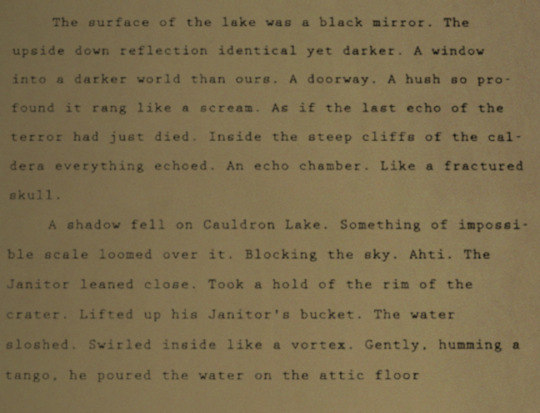
And that the quest to find the Master of Many Worlds, always leads to Alan. I’d say the roles are: Door is the wise one.
Dr. Darling in his research of the Dark Place concluded that it is a dreamscape and the dreamer has a voice, weirdly similar to his own.
I don’t really know where I should put Noir-Casey, since he’s Alan’s figment of imagination as Barry was in the AW1 DLCs, yet he’s a character with enough agency to be considered, so I will slap him in between. After Alan shoots him, Noir-Casey has an internal monologue, that ends with:
“I was the dark place, the source of it all, the vessel. Me and the writer, we were the same.”
In different circumstances, I wouldn’t take those words at face value, but here they mean exactly what they say: it’s not a metaphor, it’s the truth. There are many truths like that sprinkled throughout the game — so blatantly, it’s hard to take them seriously.
Finally, Alan himself has something to say about this. Well, aside from proclaiming himself the Master of Many Worlds in the end of the Final Draft.
“If time is not a straight line, then there are loops beyond loops; these loops vast complex superstructures beyond what’s happening to me now ahead of me, and I’m there as well, a version of me, something I have become some elevated, enlightened version, an archon, a demiurge, a demon of some sort playing a secret game, building something his past self, a pawn to get him there, a deus ex machina pushing me there.”
He’s not wrong, we know that there is a deus-ex-machina-Alan, that calls on the phone, and there is an elevated version of him, that told the boys of OGoA that something is coming. Alice as well said, that there is only one way out of the loop: ascension or destruction. We saw both, but ended on the ascension.
Given that the most powerful entity established as of now, Ahti, is not only in Alan’s film, but also had a breakdown because of the story, we can estimate Alan’s ability to influence both (many) worlds. ‘Tis tremendous.
With this knowledge let’s look at the games with a thought that Alan is indeed the Dark Place, the vessel, the source of it all.
Tom Zane was written by Alan or Alan assumed the role of Tom for some time, placing Alice as Barbara. “Had he seen her drowning” is not only about Alice, it’s about Barbara as well. By the information we have, before the Dark Presence, they were very similar: both (blond) sweet, nice ladies, both muses to their respective writers, both drowned (even if Alan twisted it to Alice being held as a hostage), both were written back (success differs). Given that the story is a spiral and loops could be endless with different events, this moment from the video for “War” by Poets of the Fall can easily be a hint from yet another loop:

There are supporting lines in the game, where Alice’s voice says Barbara’s words and Alan’s — Tom’s. And the photos from This House of Dreams, that states that this lady is the poet’s girlfriend that drowned.
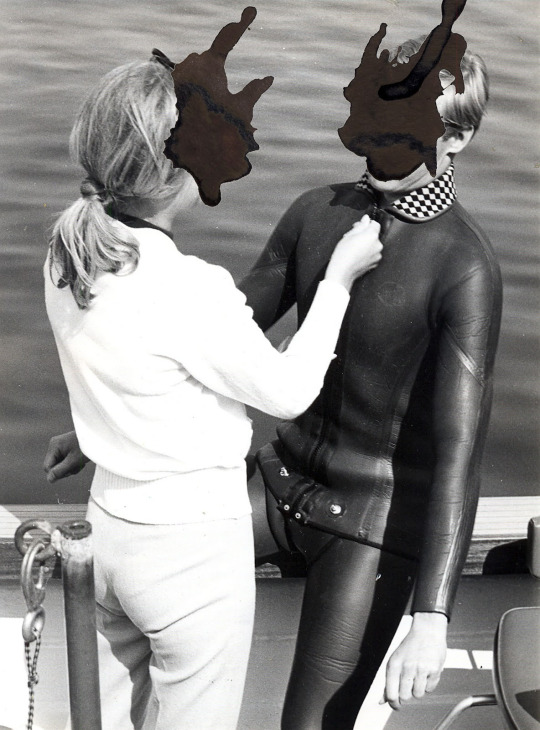

And this lady does look more like Alice than like Barbara, as we know her from the games.
In the Herald of Darkness furthermore the line “had he seen her drowning” is curious not because of the “seen” part, clairvoyance and all, we know, but because of “drowning” (Alice is dead theory might happen™). Alice had drowned per Herald of Darkness; even the first game calls it into question, as does the board in QB:
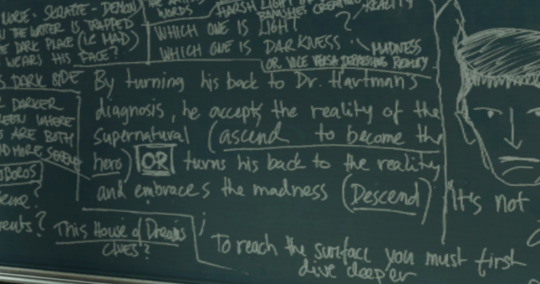
Let me sprinkle more things, I believe, can tie this up.
The Dark Place itself is something Alan created for Alice, to save her, it’s tightly connected to her and the tragedy that happened, hence it’s wet and it’s dark. He wanted her to not only return to him, but also not be far from her comfort-nightmare-zone (because he wouldn’t believe that death is a bright and nice cheerful place; if he would even allow himself to believe it, he might’ve lost the ability to drag her back from there). The Dark Place is an ocean, a lake, a body of water because Alice drowned. It is also awfully similar to the dark room every photographer uses. It makes art “real” — develops film into physical pictures, and to make those physical pictures one must find a correct way to do so. Just like Alan loops, searching for exact steps to make the story work, what solution to use when and for how long.
The Bright Falls is Night Springs and was created by Alan to spin this tale of “Alice is held hostage by supernatural darkness” in a spooky town with questionable history and a haunted lake instead of her drowning. Was there a town before Alan started to search for the way to save his wife? Who knows! But if there was, it was surely quite different. This is the tabletop game “Night Springs”:

This is the overview of Bright Falls. Find 5 differences.
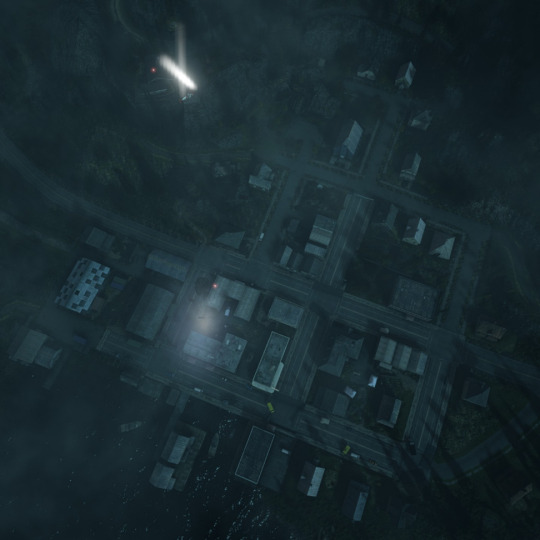
Yes, Sarah does say that there is a joke that Night Springs was inspired by Bright Falls, but not to this extent, otherwise she would surely point it out (they even stole our map!). For Alan, though, it’s only natural to use Night Springs to make a town where all those supernatural things can take place; he needed a playground, and when he needs one, as AWAN and NS DLC show, he turns to Night Springs.
And lastly, I wrote that much about the relationship between the Dark Place and time not only to hint that the story could be written starting from any date (who else won’t be surprised if in the future games we will see Alan writing the very creation of Cauldron Lake?), but also to highlight one important thing. The only character, who can manipulate time that drastically is Alan. He’s the one to create loops, he’s the one to make Mr. Scratch “send him back in time” instead of killing him, he’s the one to stall the world for Return to play out again and again, and he’s the one who dies only to be back at the safe spot in the story to adjust things. Not only his cutscenes with touching the forehead point on him dying and looping back, even the casual death during the playthrough shows him dead on the floor, not the message that this is not how the story goes. Story for Alan allows his death, and every time a player is killed, we have yet another dead Alan (F for all the Alans we lost along the way).
With all this said, we have an immortal being, that cannot be killed, can split himself into multiple other beings, can change reality in a way that anything, no matter how far into the past (or the future) it happened, will become the new truth, who shaped the primordial ocean after his wife’s tragic passing, turning it or a part of it into the Dark Place, kept dreaming the surroundings to fit his needs, and is considered the Master of Many Worlds. I think Ahti’s Sankarin Tango sums it up nicely, so I will leave you with it.
Once, he mistook an ocean for a lake, he told us in a poem In the depths of that mystery he spent his whole life Under a dark ocean, in the shadows he wanders Searching for a way back into the light to his loved one Alone, the hero continues his journey into the night That burden on his shoulders forever like a promise In this game this fool is struck down again and again Only a moment's rest in death before he's called back again Time breaks into eternity, a gunshot echoes There’s never a happy end for him This story has been told many times before The hero has a thousand faces and a hopeless path Alone, the hero continues his journey into the night That burden on his shoulders forever like a promise In this game this fool is struck down again and again Only a moment's rest in death before he's called back again
#rcu theory#alan wake#alan wake 2#alan wake game#alan wake ii#remedy connected universe#alan wake's american nightmare#awan#night springs#remedy games#remedyverse#remedy entertainment
29 notes
·
View notes
Text
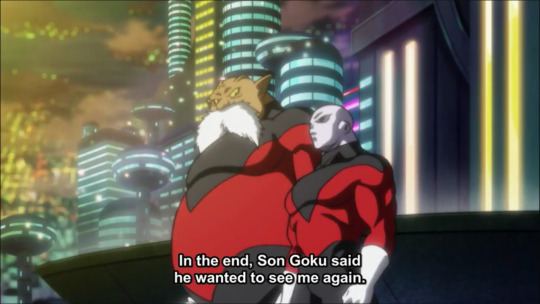
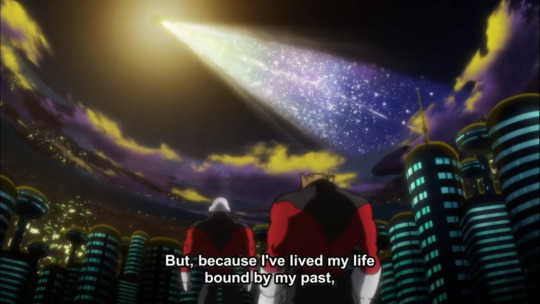
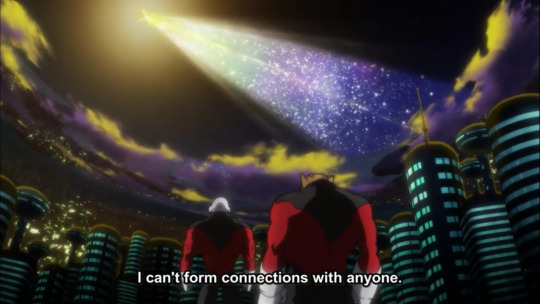
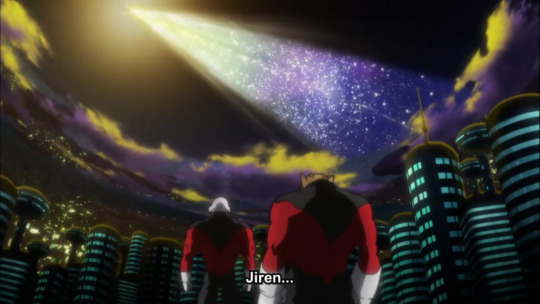
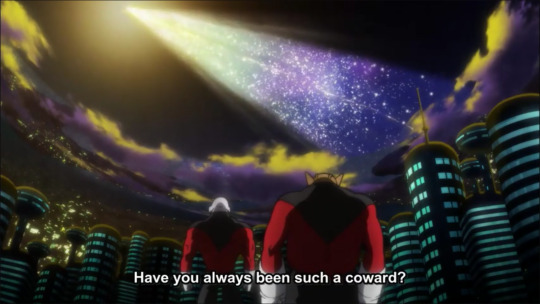
KEEPING IT REAL WITH JIREN & TOPPO
First of all I love that the final antagonist of the arch was somebody who fights for nobody but himself, but not because he has a wonderfully large ego like Freeza, but rather because he purposefully chooses to and has crafted a philosophy that calls for this. He, unfortunately, believes this with his full capabilities of conviction. He has sacrificed so much in this belief.
So many times Goku and the others credit their strength to the way that they fight for others. Then here comes a guy who is unfathomably strong, and he has gotten here by fighting for nobody but himself.
But in the end he can't win, and it is the teamwork of the most UNLIKELY DUO that brings him down. And as these two diametrically opposed warriors both sacrifice their time in the ring in order to bring Jiren down with them, Jiren realizes that the "secret" to the Seventh Universe's strength is "the power of trust."
Which again. I am kind of sitting here in awe about. Goku and Freeza. Took a chance on each other because they had to. Goku and Freeza. FREEZA. He didn't want to do it. He did not want it to end this way. But he did it. With a heated fervor he did it. With a tactician's clarity he ended this all the while incorporating Goku's strength into his strategy. And they entrusted all to Android 17 as the last man standing.
And then it turns out that the Grand Zenos had a greater meaning behind this whole tournament, and that if the winner's wish had been a selfish one, they would have just wiped out all of reality as being not worth it! But if it was the "right" wish, a selfless one, then all the universes would be restored by the wish itself. They were sure that if the winning mortal wasn't already virtuous, then the challenge would have made them so.
Which. By the way. In all the philosophy our human minds have mustered. There are several distinct and overlapping theories as to what morality and ethics COULD EVEN BE. But on Dragon Ball Super, the supreme rulers of the multiverse have spoken: indubitably, morality is Helping Out Your Fellow Mortal even at the expense of yourself. WOW! Glad that the endless discussion has been concluded!!!
Morality is about MERCY and TRUST and ALTRUISM. It is Strength and Love and Passion.
WHAT A LOVELY AND COMPELLING STORY !!!!
Anyway back to Jiren.
He got really relatable and believable at the end there. Oh My Lord. He had felt the intolerable pain of loss in his time, and it at first encouraged him to respond to the villain who had wrought it. After his second great loss, he then could not deny what was glaring him in the face: that "might makes right." That's why he lost the first time, and that's why he had lost the second; it was because he wasn't strong enough, because HE wasn't strong enough, he could not rely on something as fallible as teamwork and virtue in order to win. All those things are corruptible, beliefs can change - but the hard, tangible reality before him is that when two opposing forces meet, THE MIGHTIER ONE WILL WIN.
And that was how he made sense of his world. Any organism is tasked with making sense of its world, and that perspective needs to meet the needs of the organism. Us humans, as instinct, incorporate emotional, social, logical, practical, and spiritual nuances when we are tasked with "making sense." It has to make sense TO US, therefore use all that we have to offer.
I appreciate Jiren as a character who so succinctly conveys our own nature to us. At moments of survival, one of the many vital tasks of the nervous system is to figure out the WHAT. Past the moment of impact, we continue to "make sense" of what it was retroactively, as its effect on us permeates. This is how we learn for next time. When Jiren first experienced that loss in his youth, he at first found his purpose in virtue, and that he was justified in righting this wrong both morally and by his own internal feelings of rage. After he lost again, he made a new sense by wiping away what now seemed like distractions so that he could see the overwhelming villain for what it was: SHEER POWER, nothing else. His comrades disassembled, his new family was destroyed. They could be conquered and their behavior altered. They could be killed. The only intransient thing that Jiren had seen was the absolute rule of cause and effect, of win and lose, of kill or be killed. Might makes right because might decides what happens at all, it IS morality by virtue of being the last man standing, it is reliable.
So in a perfectly predictable twist of fate, Jiren commits himself in totality to the rules that had destroyed him. But this time, he would yield the reins and use that law for his own favor. He has been convinced of the irreproachable legitimacy of Might, and he would have it for himself.
Because here's the thing. And this is what I'm REALLY interested in. This is what it all comes down to, everywhere you look, and what I'm so delighted to see expressed in his character.
WHAT was he fighting for? Rather, WHY was he still fighting? Not for hope, not for goodness, not for others. For himself, okay, but why does he NEED this?
He's not fighting FOR something, but AWAY from something else - he is compelled to keep improving in order to avoid EVER FEELING THAT LOSS AGAIN, by his own admission and by the other characters' astute wording.
But it's not just the pain of loss. What he is so utterly compelled to FIGHT AGAINST, what he cannot TOLERATE, is the feeling of HELPLESSNESS.
I felt that feeling a lot in this arch. I felt it from the Destroyers and Kais sitting on the bench, knowing that their lives were on the line but that all they could do was sit and stifle it, while their angels sat blithely behind them. Are even gods just pawns in this grand cosmos?
Okay let's get real. The human reflex (and ability at all) to Avoid Feelings is what grants us our traumatizability. Something about our relatively huge frontal cortex allows us to suppress sensations, reactions, feelings, and other interoceptive experiences that would normally be restorative. The reason that animals don't get traumatized seems to be because they experience in totality their own activation, the freeze states if engaged, and then the release of the energy that had been mobilized in their system for survival.
I am not bullshitting you. Read Dr Peter A Levine
One of the biggest obstacles in trauma healing for humans is our reflex to AVOID HELPLESSNESS and therefore to AVOID embodying our own freeze responses. It's a complex and bizarre thing, but our own health and survival is interwoven through all of our neurological layers, and so deficits or damage presenting to our "higher" layers of mammalian perception very much can generate a response that we'd think more typical of the "lower" layers. The pyramid base of our most primitive coding supports all of us. The essence of the freeze/collapse seen in an overpowered reptile can be seen in a human infant overwhelmed by a lack of warmth and loving care. To a social mammal, not feeling that connection is devastating and means death. And a baby cannot fight or flee. Do you see where I'm going with this?
I AM NOT BULLSHITTING YOU!!!!! Read this book & his other books & other books by people like Bessel van der Kolk and Gabor Mate ETC
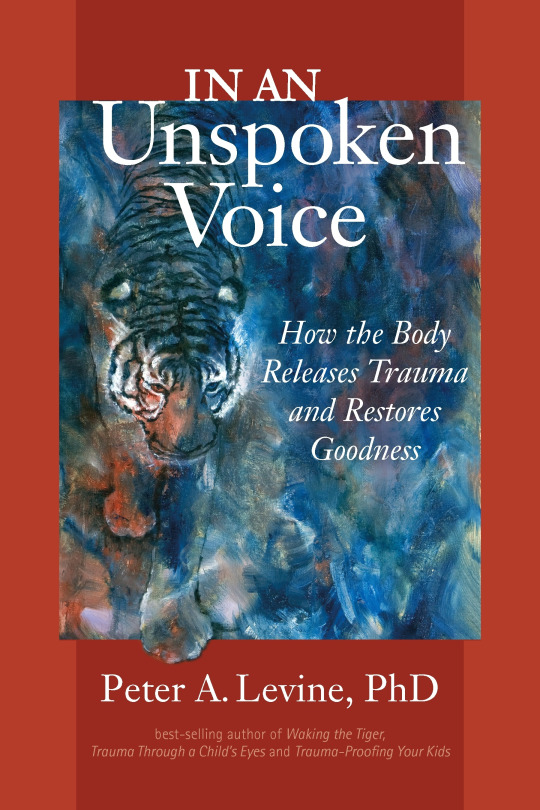
(Image ID: Super Interesting book called "In An Unspoken Voice" by Peter A Levine)
The key to resolving trauma is to be able to move through, or rather embody and gradually release, the visceral reality that did not get processed at the time of impact. The basic fundamental rules of instinct can still be found when we talk about more "abstracted" forms of trauma like developmental and emotional. But understand that one person is one structure of unity, necessarily so because how could we have evolved otherwise - and mind IS body and body IS mind, and invoking response in one entails a response in the other. Mind and body are not distinct entities in anything but prevailing societal philosophies.
Soooooo. Anywayyyyyy. Bear with me here. A lot of human trauma comes when a freeze state is entered and never properly exited. Those states are meant to be self-terminating, but through the power of the human brain, we can avoid letting things flow naturally. And again, in the complex evolutionary nuances of us primates, this doesn't have to be a hard collapse. The same instinctual wiring can be founds in things like a partial collapse of some systems (voice not working, anyone?), all the way over to just a general dull & dead disassociation. When sympathetic arousal of the nervous system pays out no dividends, the last resort is to full-reverse into parasympathetic shutdown. But when that happens, the "survival energy" (as is frequently termed in the book I mentioned above PLEASE READ IT) does not just go away. It was still mobilized, the muscles are primed, the nerve cells are primed, all systems are go, but it all just STOPS for a bit. To give the tiger time to give up on you. And then, when it's time, freeze will terminate, and all that energy is still there for you to either launch a rageful counter-attack or to engage in a quick flight - whatever seems to give you the higher chance of survival.
As the energy is held in reserves, so is the full state that you entered freeze with. All of the visceral sensations of rage, fear, and helplessness.
That is why humans avoid exiting a freeze. BECAUSE THAT STUFF IS REALLY HARD TO TOLERATE. The experience drove you to overwhelm for a reason. And if your nervous system did not develop in an environment of love and warmth and support, then it'll be less tolerant of difficult sensations, and you'll be more prone to disassociation and distraction. Many of us just go into shutdown kind of immediately without ever knowing it because we're detached from ourselves, we just know that we don't and can't do things but we don't feel "anxious" like what everyone else is talking about so what gives? (<- Me. But I have a lot more interoceptive awareness now so I can track it and so now I'm awesomne. I mean I'm still immensely fucked up. But there is now hope.)
Again it's all a very complex subject that fascinates me to no end & that I cant fuking explain becasue what do i know. Please Read Books <3 Please look up "somatic experiencing" or maybe just read the books. I have given that book above as a gift to several different people and I am going to keep doing it
So basically coming into contact with your own frozen-over intensely vulnerable states in order to move through them (resolve, release, renegotiate, etc), is a challenge. Human beings are fiercely social and our nervous systems are wired to respond to each others'; we cannot live alone, and we certainly cannot heal alone.
SO WHAT DOES THIS HAVE TO DO WITH JIREN FROM DRAGON BALL SUPER ????
I'LL TELL YOU. He is literally just running hardcore from that feeling of helplessness. He is resolved to Never Feel It Again.
And the person he represents you see all of the time in real life. There are one million ways to avoid resolving what needs to be resolved, overexertion is definitely one of them. There are definitely gym rats who exhaust their muscles in order to avoid feeling their twitching unrest, to avoid feeling small and weak. Think about the sort of mindset that a lot of people have when it comes to working out. It seems to be about punishment and discipline. Of course the people who have it right understand that it's about vitality, enjoyment, and patience - but think about how hard it is to convince someone more toxic-minded of that. Harboring that trapped survival energy will reduce the complexity of your thoughts and your comfort in having them; you get caught in black-and-white dichotomies, you get stuck in "kill or be killed," you get stuck in obsessive compulsions, you can't comprehend letting things flow and you can't be okay with it, your social systems shut down and you cannot feel the support of others, you don't feel in control, and everything at its roots seems to be about your own fear; so you overcompensate.
Jiren has made sense of his world. It is a vital thing to do. And he has decided what he has to do to overcome his enemy. But the reason that he continues to FEEL the enemy when it is no longer present is because he has not healed. His enemy is the horrible helplessness he had felt. It haunts him. It stays with him. He tries to conquer it. But it follows him. It threatens to one day consume him. And he finds the enemy in external circumstance (as we are biologically geared to do, at our lowest levels, to orient toward and to locate the possible threat, toward what has elevated us so), but the real enemy is within. It's because his pain has not been resolved. It is because he has not learned how to befriend his bodily states and to move through them.
And this is KEY here - It is because he has REJECTED FRIENDSHIP, the necessary visceral feeling of safety and love, which would serve as both his safe spot and his empowering resource as he ventures into his most difficult feelings. You need good experiences to counteract the bad in order to unwind those knots.
We see this sort of stuff all of the time in every single one of us. Jiren was a sensitive little boy with no reason not to be, who (like the best of us) felt every ounce of his world with wonder - and then he had it all ripped out of him by the most horrible circumstances ever. And with the threat still looming, he couldn't ever rest. That sort of chronic stress will twist you all up. And then when his world flipped over again, it must have been a huge relief to just embrace a simple, BELIEVABLE philosophy, and to just dedicate all of his anger and fear toward one task.
I'm just impressed to see it portrayed so plainly on Jiren. It's all of us. It's not hard to see, but there are many ways to see it. It takes a certain sensitivity and skill to pluck it out of the world and write it all down. And then especially his short conversation with Top that this post started with screenshots of. If he suffered such an intense loss so young, and then again years down the line, of course he can't make any connections. He's not just out of practice, but susceptible to opening the door to that pain again.
I really liked how this arch was about trust in the end. I noticed throughout it the prevalence of duos (two Zenos, Beerus & Champa, Androids 18 & 17, Piccolo and Gohan teaming up, and especially KALE AND CAULIFLA), but I tend to hone in on duos for my own complex reasons of being so I figured that that was just me. But then in the end when it took the Most Unlikely Duo In Cinematic History to take out and teach Jiren, I was like oh my word ... Poetic cinema.
So that's my post. I LOVE how it was all handled. So succinct as always in order to leave more room for the fighting. Unlike my posts which are long despite my best efforts. Thanks for reading. And read that book!! Chao <3
19 notes
·
View notes